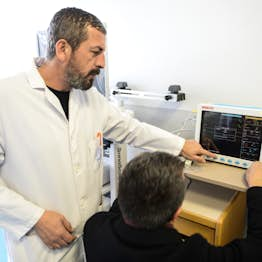Introduction
The year 2019 saw the Kosovan government resign in July and early elections on 6 October 2019; a government was formed in February 2020. The partnership committee meeting between Luxembourg and Kosovo, planned for the second half of 2019 in Pristina, Kosovo, had to be postponed.
Read more
In 2019, Luxembourg’s official development assistance to Kosovo amounted to more than EUR 5.4 million. In addition to the technical assistance project at the Ministry of European Integration Luxembourg’s Development Cooperation focused in particular on the sectors of health and vocational training.
In parallel with this support, Luxembourg continued to co-finance the district heating network development project in the capital, Pristina, implemented by German development bank KfW. In addition, the project implemented by the EBRD since 2018, which provides advice for small and medium-sized enterprises in Kosovo, has hit its stride during the past year.
The two multilateral projects, run respectively with UNICEF and jointly with the UNDP, the WHO and UNV, developed in a satisfactory way and will be completed at the end of 2020. In 2019, the ‘Healthier Kosovo’ project (UNDP-WHO-UNV), whose goal is to contribute to the reduction of the environment-related disease burden on population health, trained the members of the Environment and Health Committee, which reports to the Office of the Prime Minister. The capacities of the national public health institute were strengthened in order to measure the impact of air pollution on health by carrying out health impact assessments using Air Q+, a specially designed programme. The first studies were completed together with the Kosovan hydrometeorological institute in 2019. At the same time, an analysis was conducted of policies and laws on air pollution management, as well as various studies on air quality in schools.
Luxembourg has continued to support action taken by Caritas Luxembourg, particularly through Fondation Kosovo-Luxembourg (FKL), its Kosovan entity, with the most vulnerable groups in Kosovo. Finally, in relation to support for Kosovo’s civil society organisations (Kosovar Civil Society Foundation (KCSF)), the third regional training course for NGOs on the contribution to European integration was held in October 2019, in collaboration with the Bruges College of Europe.
Priority areas of intervention
- Good health and well-being
- Quality education
- Gender equality
- Affordable and clean energy
- Decent work and economic growth
- Reduced inequalities
- Sustainable cities and communities
Reference data
- Population: 1,810,366
- GNI (per resident): USD 4,640
- Life expectancy: 72
- Indicative Cooperation Programme: 2017-2020
Key achievements 2019
- In July 2019, an extension of 12 months and a budget increase of EUR 700,000 was granted to enable Caritas, through its local entity, the Fondation Kosovo-Luxembourg (FKL), to continue its important work with the most vulnerable groups in Kosovo and to consolidate the results achieved. Marginalised groups, including women, young people and minorities, are the main beneficiaries of Caritas's current remit in Kosovo.
- In April 2019, the acting chargée d’affaires participated in a conference on the impact of air pollution held in Pristina as part of the ‘Healthier Kosovo’ project implemented by UNDP, the WHO and UNV. Through many events such as this conference, the project is making a major contribution to finally putting the topic of air pollution at the heart of debate in Kosovo.
